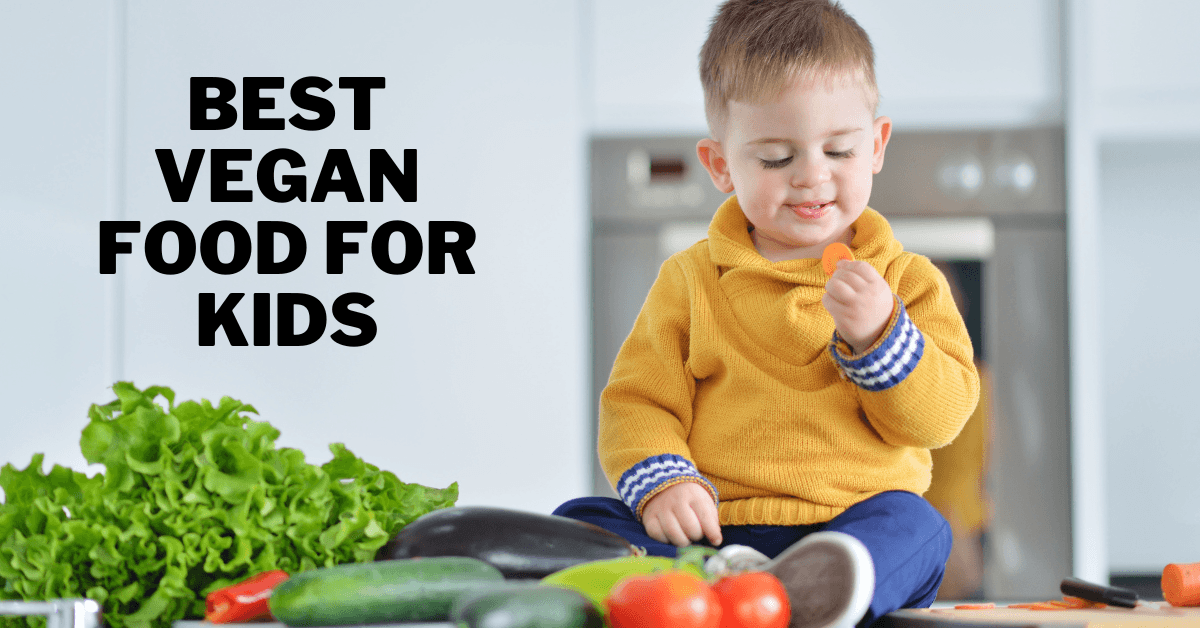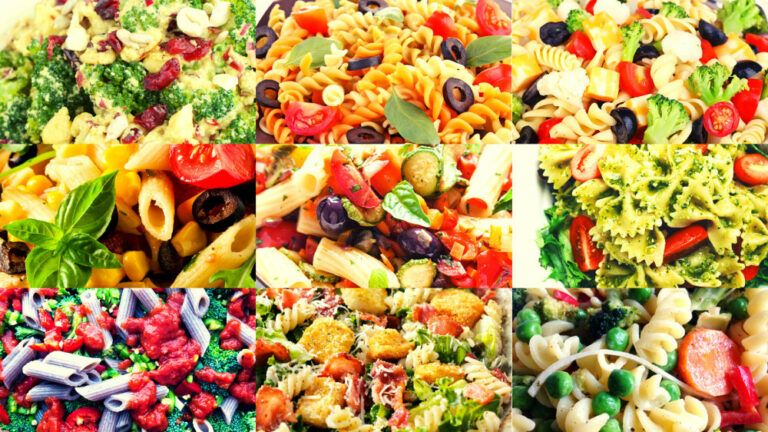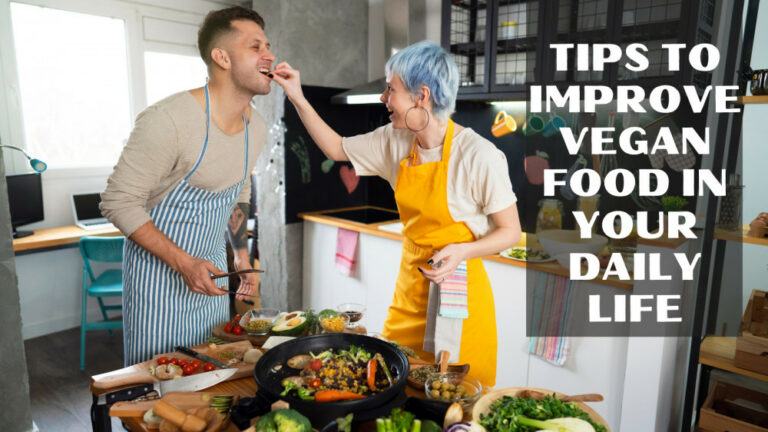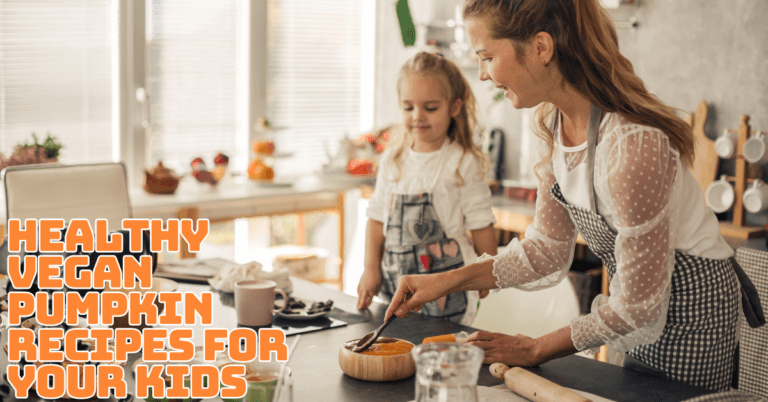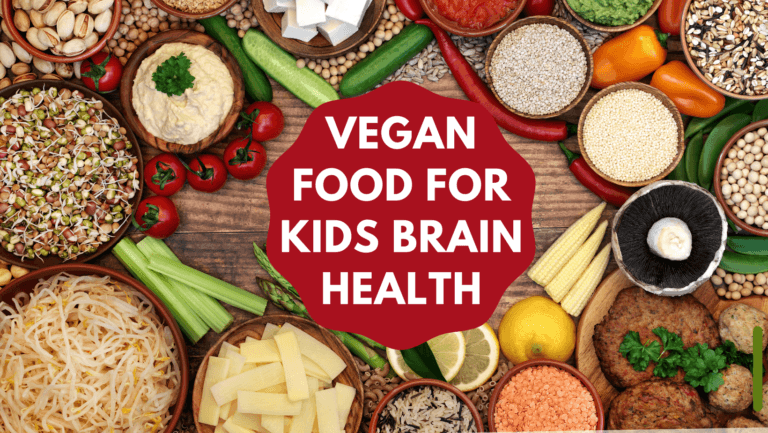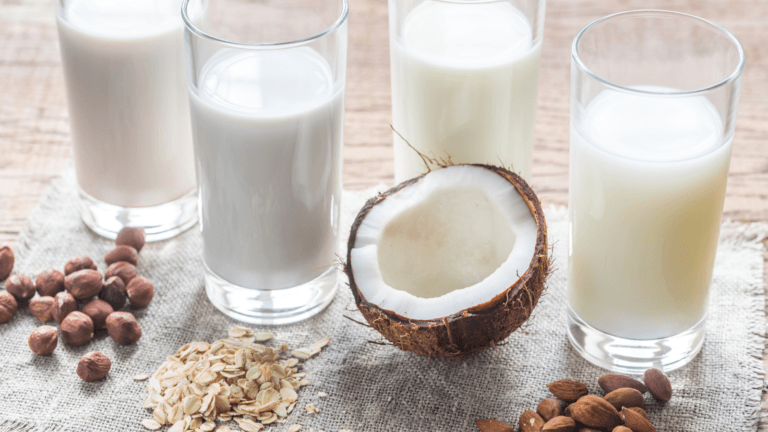Best Vegan Food For Kids
Best Vegan Food For Kids
Navigating the world of children's nutrition can be exciting and challenging, especially when embracing a vegan lifestyle.
As parents, caregivers, or educators, ensuring that kids receive all the necessary nutrients for their growth and development is a top priority.
Fortunately, a well-planned and balanced vegan diet can provide many health benefits for children while instilling a lifelong appreciation for wholesome foods.
This article guides crafting delicious and nutritious vegan meals tailored to kids' tastes and nutritional needs.
From colourful fruits and vegetables to protein-rich legumes and plant-based alternatives, we will explore a variety of creative and kid-friendly recipes that nourish their bodies and cultivate a positive relationship with food and the environment.
Discover how to make every meal an opportunity for learning, exploring, and savouring the goodness that plant-based eating offers our youngest generation.
Benefits Of Vegan Food For Kids
Vegan food offers many benefits for kids, providing them with essential nutrients, promoting healthy growth, and instilling positive eating habits. Here are some key details highlighting the advantages of a well-balanced vegan diet for children:
1. Nutrient-Rich Diet
A well-balanced vegan diet for kids encompasses nutrient-rich foods essential for optimal growth and development.
Colourful fruits and vegetables provide a spectrum of vitamins like vitamin C for immune strength and vitamin A for healthy vision.
Whole grains offer fibre, B vitamins, and minerals crucial for energy production and cognitive function.
Protein, healthy fats, and minerals like iron and calcium are all provided by nutrient-rich sources like nuts, seeds, and legumes, which are crucial for developing strong muscles and bones.
2. Fibre Boost
A vegan diet for kids emphasizes whole plant foods naturally abundant in dietary fibre. This fibre supports healthy digestion by promoting regular bowel movements and preventing constipation.
Additionally, the high fibre content of fruits, vegetables, whole grains, and legumes helps kids feel full and satisfied after meals, reducing the likelihood of overeating and aiding in weight management.
This dietary fibre intake fosters gut health and instills positive eating habits that can benefit children's overall well-being in the long run.
3. Heart Health
A vegan diet for kids supports heart health by avoiding sources of saturated and trans fats commonly found in animal products. Instead, plant-based fats like those in avocados, nuts, and seeds are encouraged.
These heart-healthy fats are abundant in monounsaturated and polyunsaturated fatty acids, linked to a lower risk of developing heart disease.
By choosing these heart-healthy options, kids can develop eating patterns that promote cardiovascular well-being early and establish habits that benefit their long-term health.
4. Reduced Risk Of Chronic Diseases
Obesity, type 2 diabetes, and various malignancies are among the chronic diseases less likely to affect children who follow a balanced vegan diet.
Parents can encourage their children to develop good eating habits that support managing their weight and blood sugar levels by emphasizing whole plant foods, including fruits, vegetables, whole grains, legumes, and nuts.
This early foundation of nutritious eating sets the stage for a healthier future, helping kids establish lifelong habits that may lower their susceptibility to these diseases as they age.
5. Allergen Avoidance
A vegan diet offers a natural solution for kids with allergies or intolerances, as it eliminates common allergens such as dairy and eggs.
For children who experience adverse reactions to these foods, transitioning to a vegan diet can relieve symptoms like digestive discomfort, skin issues, and respiratory problems.
By focusing on plant-based alternatives, parents can ensure that their kids receive essential nutrients without the risk of triggering allergic reactions.
6. Cultivating Diverse Palates
A vegan diet for kids can play a significant role in cultivating diverse palates.
By emphasizing a variety of fruits, vegetables, whole grains, nuts, seeds, and legumes, parents introduce their children to a spectrum of flavours, textures, and aromas.
Exposure to diverse foods expands their taste preferences and encourages an adventurous and open-minded approach to eating.
Kids who grow up enjoying a wide range of plant-based foods are likelier to develop a lifelong appreciation for different cuisines and ingredients, setting the foundation for a well-rounded and healthy dietary lifestyle.
7. Positive Eating Habits
Introducing kids to whole, unprocessed foods through a vegan diet can profoundly impact their eating habits.
By emphasizing natural and nutrient-dense foods like fruits, vegetables, whole grains, nuts, and seeds, parents create a foundation for positive eating habits that can extend into adulthood.
Early exposure to these wholesome options helps children develop a taste for real, nourishing foods and fosters an understanding of the importance of making nutritious choices.
8. Embracing Variety
A vegan diet opens up a world of culinary exploration for kids, exposing them to diverse cuisines and flavours from around the globe.
Without the confines of animal products, children are more likely to venture into a wide range of plant-based foods, including exotic fruits, unique vegetables, ancient grains, and aromatic spices.
This exposure enhances their palate and fosters cultural awareness and an appreciation for different food traditions.
9. Supporting The Environment
Educating kids about the environmental implications of their dietary choices instills a sense of responsibility and empowers them to make mindful decisions that positively impact the planet.
A vegan diet aligns with eco-conscious values by reducing greenhouse gas emissions, conserving water, and minimizing deforestation associated with animal agriculture.
By understanding the connection between food production and the environment, children can develop a deep appreciation for the natural world and the importance of preserving it for future generations.
Best Vegan Food For Kids
In this journey through the realm of vegan food for kids, we embark on a path that nourishes both body and mind.
As parents, we hold the unique opportunity to introduce our children to a world where food is not just sustenance but a powerful tool for positive change.
The choices we make today ripple into their tomorrow, shaping our tastes, values, and relationship with the world around them.
Here's a detailed list of considerations and strategies for providing vegan food for kids:
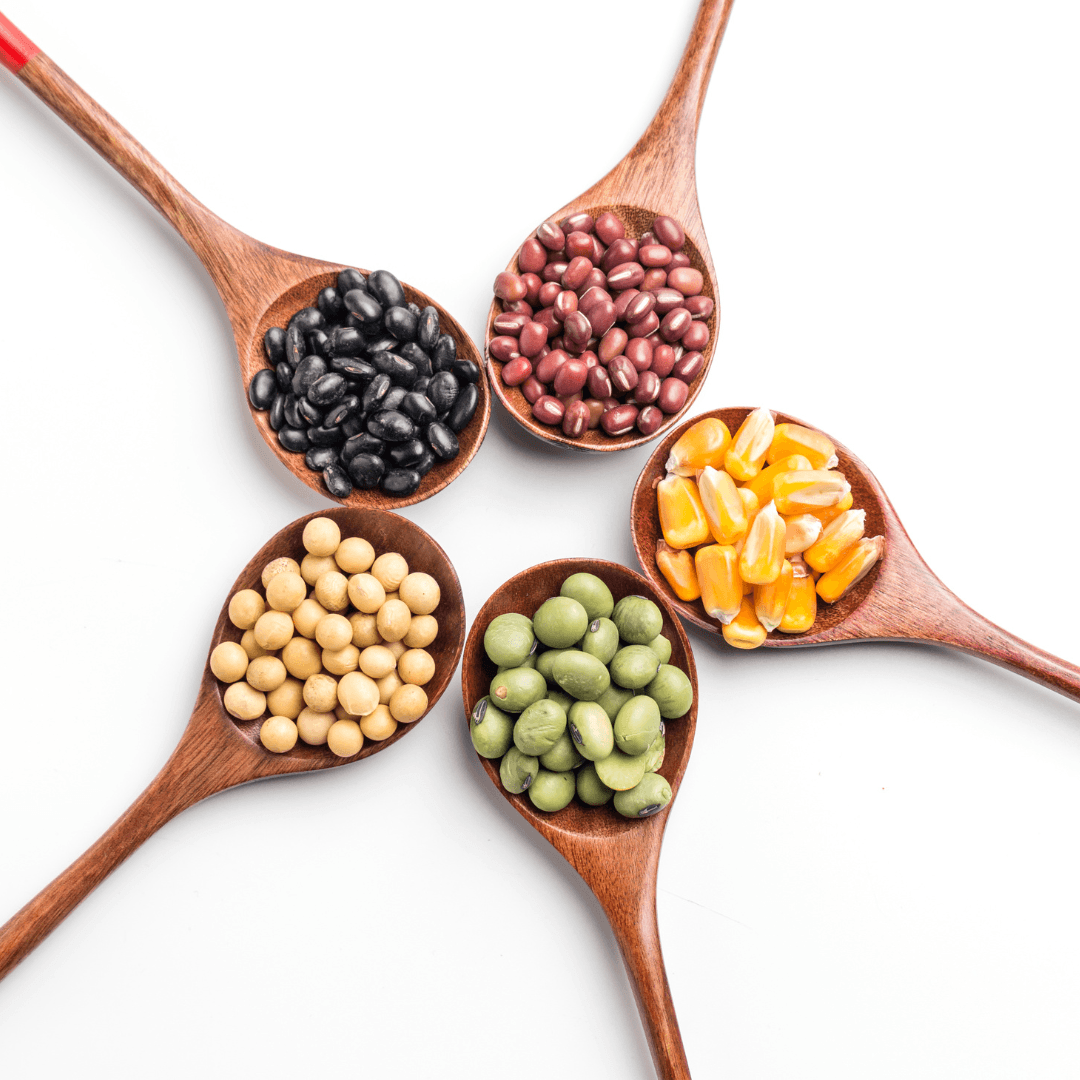
1. Nutrient-Rich Choices
Nutrient-rich choices form the cornerstone of a balanced and vibrant vegan diet for kids.
Your children can receive a symphony of vitamins, minerals, and antioxidants necessary for their health by eating a wide variety of complete foods.
Infuse their plates with a spectrum of colours, from the deep greens of spinach to the bright oranges of sweet potatoes, each contributing unique nutritional benefits.
Plant-based protein takes center stage, offering many options to fuel their growth. Tofu and tempeh, with their versatile textures, become culinary canvases for creativity.
Lentils and beans bring nourishment and fibre, supporting digestion and providing a steady energy source.
Quinoa, a complete protein, ensures their bodies receive all the necessary amino acids. Remember the power of nuts and seeds, which are rich in healthy fats and micronutrients.
These choices provide the building blocks for physical development and lay the foundation for a lifelong relationship with wholesome, nutritious foods.

2. Calcium And Vitamin D
Ensuring sufficient calcium and vitamin D intake is crucial for your child's bone health, and a well-planned vegan diet can provide these essential nutrients.
To meet their calcium and vitamin D requirements, delectable fortified plant-based milk, such as almond, soy, or oat milk, is an easy and tasty option.
These fortified options often provide similar amounts of calcium as dairy milk without the drawbacks of saturated fats and cholesterol.
Plant-based yogurt, a delightful snack or breakfast addition, is fortified with calcium to support bone development further.
Fortified cereals offer a crunchy and nutritious start to the day, contributing to your child's daily calcium intake.
Vitamin D, often called the “sunshine vitamin,” aids in calcium absorption and bone health.
While sunlight is a natural source of vitamin D, fortified foods can play a vital role, especially in areas with limited sun exposure.
Thoughtfully incorporating these fortified sources into your child's diet ensures they receive the nutrients essential for their growing bones and overall well-being.
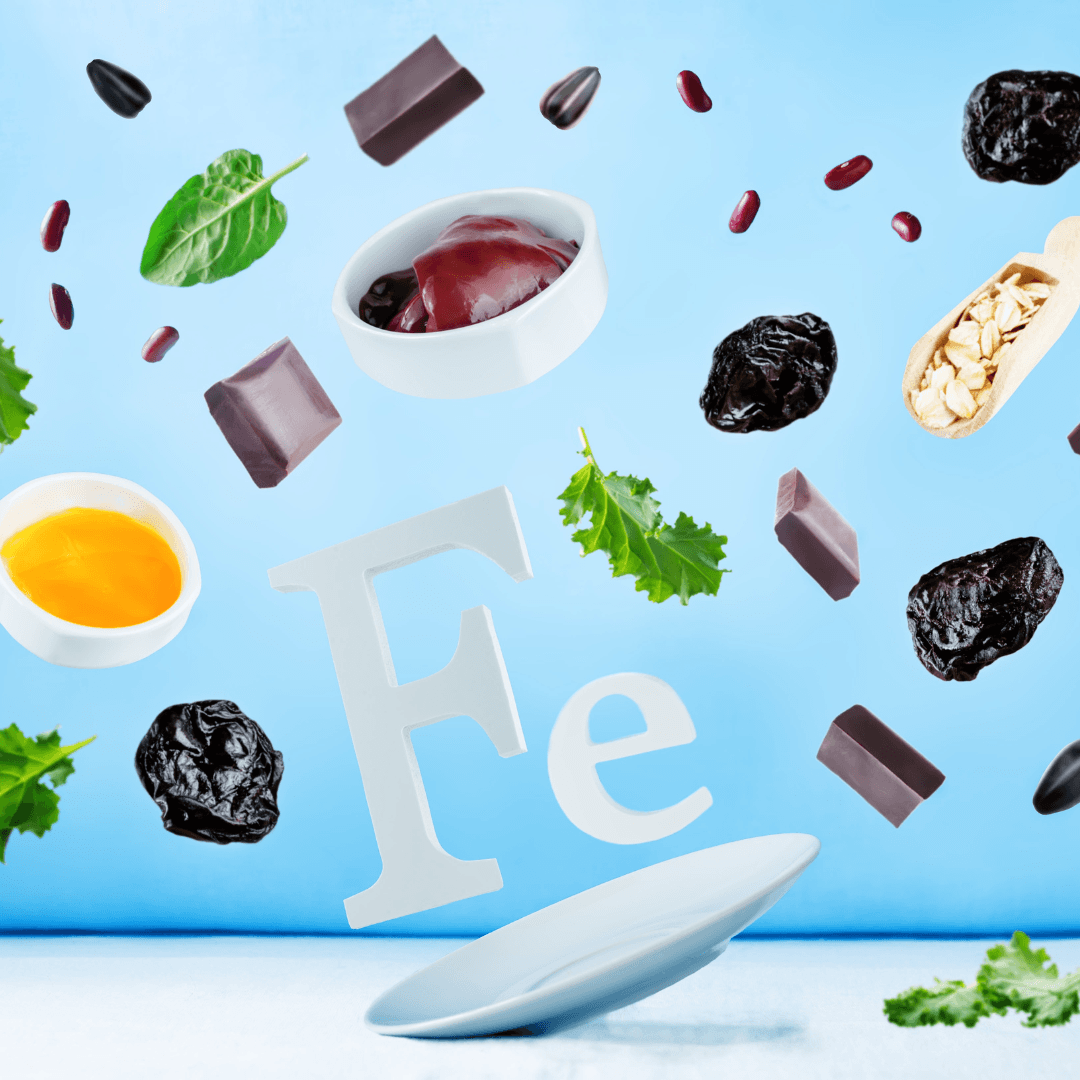
3. Iron-Rich Foods
Iron is a critical nutrient for children's growth and cognitive development, and a vegan diet can provide ample iron through various plant-based sources.
Among the plant foods that contain non-heme iron, lentils, chickpeas, and beans are among the best sources.
These legumes can be incorporated into soups, stews, salads, or veggie burgers to add flavour and nutrition to your child's meals.
Quinoa, a versatile grain, is another iron-rich option that offers a complete protein profile. Fortified cereals can become a fun and convenient way to boost iron intake during breakfast.
Leafy greens like spinach offer a nutrient-packed addition to salads or smoothies, while pumpkin seeds can be sprinkled over oatmeal or yogurt.
Pair iron-rich foods with vitamin C-rich sources, such as citrus fruits, berries, or bell peppers, to enhance iron absorption.
When vitamin C is present, non-heme iron is better absorbed and is easier for your child's body to utilize.
By thoughtfully incorporating these iron-rich plant foods into their diet and paying attention to complementary nutrients, you can ensure your child receives the iron they need for optimal health and vitality.
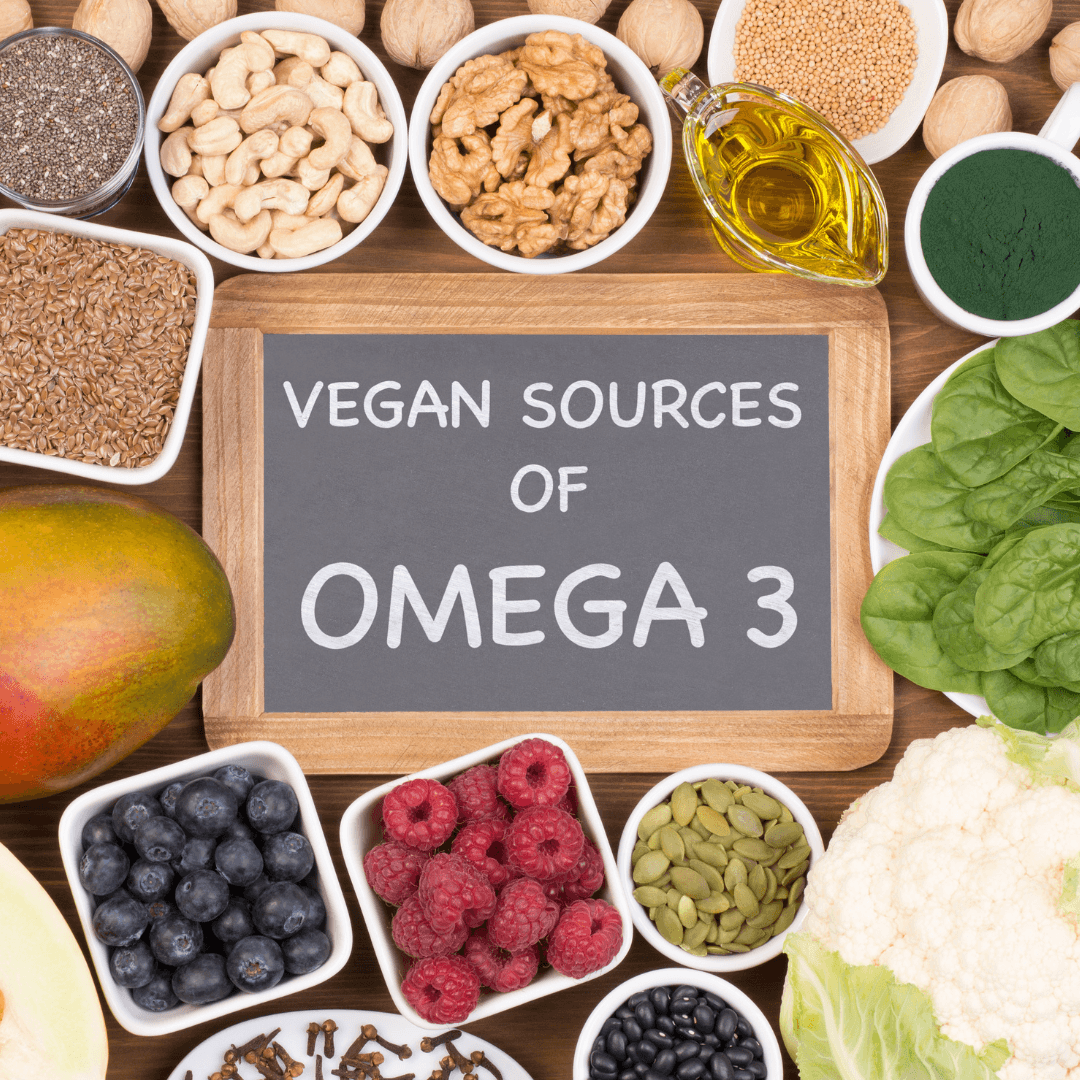
4. Omega-3 Fatty Acids
Children's cognitive development and heart health depend on omega-3 fatty acids, and a well-planned vegan diet can provide these important nutrients through various plant-based sources.
Omega-3 fatty acid alpha-linolenic acid (ALA) is abundant in flaxseeds, chia seeds, and hemp seeds.
These seeds can be added to yogurt, porridge, or smoothies for a nutty flavour and nutritional boost.
Another great source of ALA is walnuts, which can be eaten as a snack or added to salads and baked dishes.
While ALA is crucial, it's also a good idea to consider consuming supplements from algae or fortified meals to ensure enough consumption of the longer-chain omega-3 fatty acids, EPA and DHA.
These fats are essential for the health of the eyes and the brain.
You can help ensure your child gets the crucial nutrients they require for ideal growth and well-being by including a variety of omega-3-rich foods in their diet and, if necessary, talking with a healthcare expert about supplementing alternatives.
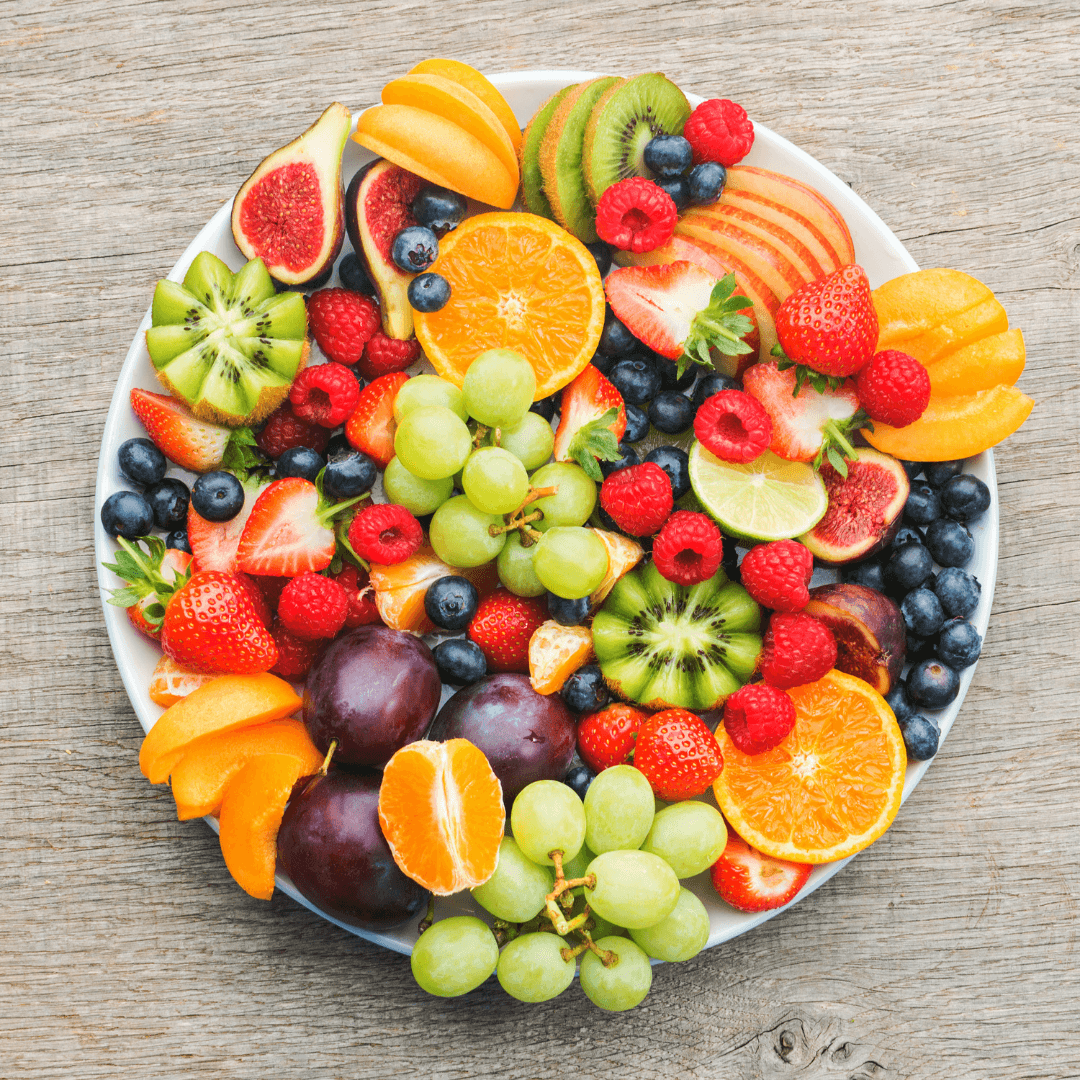
5. Balancing Macronutrients
Balancing macronutrients is essential for ensuring kids' sustained energy levels, growth, and overall health on a vegan diet.
Whole grains play a crucial role in providing complex carbohydrates and fibre. Opt for nutrient-dense options like brown rice, whole wheat pasta, quinoa, and whole grain bread.
As a result of their gradual energy release and consistent fuel supply throughout the day, these foods aid in maintaining stable blood sugar levels.
Whole grains also contribute to a feeling of fullness and support healthy digestion due to their high fibre content.
Pair whole grains with plant-based protein sources such as beans, lentils, tofu, and tempeh to further enhance the nutritional profile.
Including various colourful vegetables and fruits alongside these grains and proteins will ensure a well-rounded nutrient intake. Remember that portions vary based on a child's age, activity level, and needs.
By incorporating a diverse range of whole grains and protein-rich foods, you can create balanced and satisfying meals that support your child's growth and development while adhering to a vegan diet.
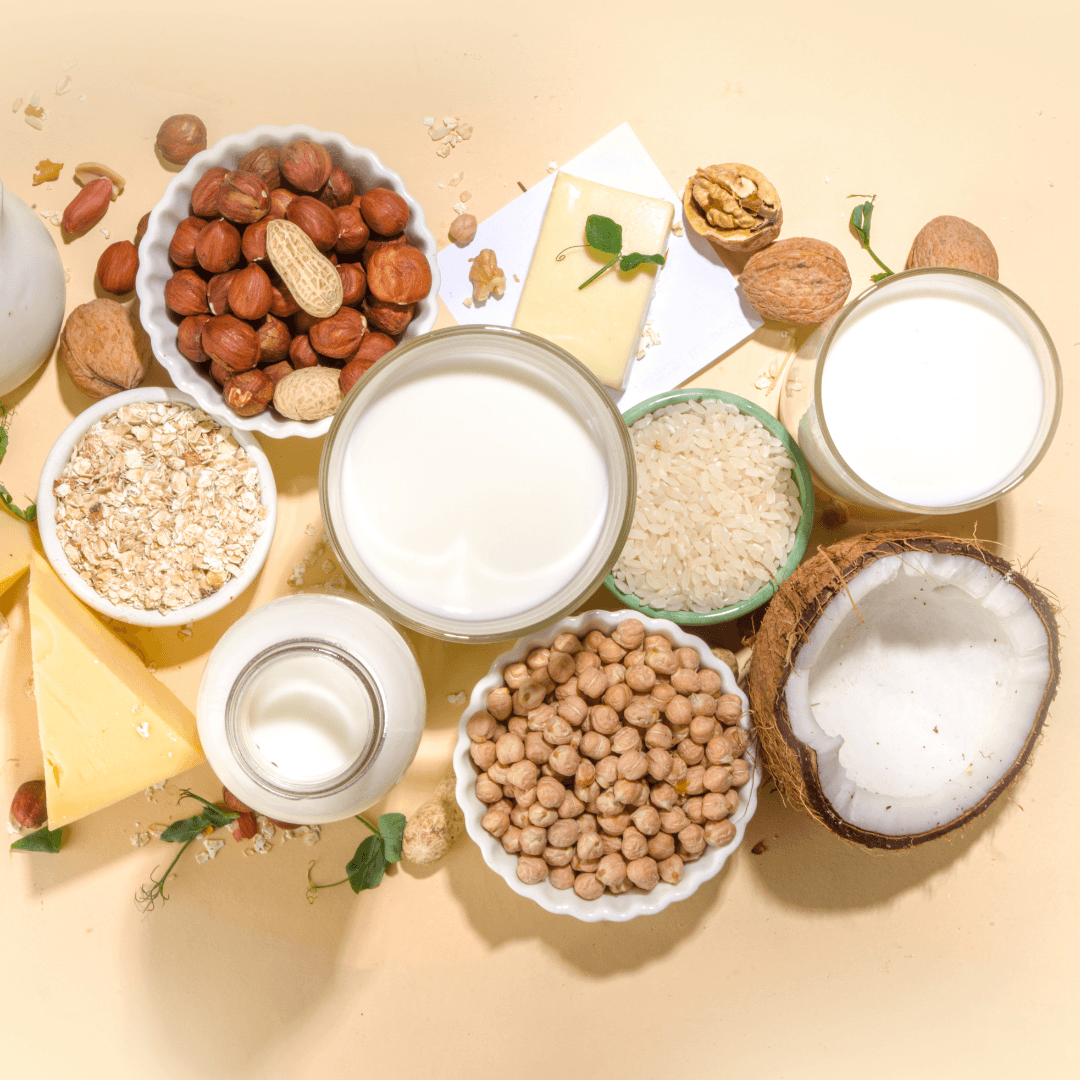
6. Plant-Based Dairy Alternatives
Plant-based dairy alternatives are a valuable addition to a vegan diet for kids, offering important nutrients while avoiding animal products.
When selecting plant-based milk, opt for fortified varieties to ensure your child receives essential nutrients such as calcium, vitamin D, and vitamin B12.
The nutritional profile of dairy milk is replicated in fortified plant-based milk like almond, soy, oat, or coconut milk by adding these nutrients.
In addition to supporting calcium absorption and overall bone health, vitamin D is essential for developing strong bones and teeth.
The synthesis of red blood cells and the health of the nervous system depend on vitamin B12. Checking the nutritional labels on plant-based milk cartons can help you identify fortified options.
Additionally, incorporate a variety of fortified dairy alternatives, such as plant-based yogurt, cheese, and butter, into your child's meals to ensure a well-rounded intake of essential nutrients.
By making informed choices and including fortified plant-based dairy alternatives, you can support your child's health and nutrition on a vegan diet.

7. Exploring Flavours And Textures
Exploring flavours and textures is a fun and essential aspect of incorporating vegan food into your child's diet. Experimenting with various herbs and spices can introduce exciting and appealing dish flavours.
Herbs like basil, thyme, cilantro, and spices such as cumin, turmeric, and paprika can transform simple meals into vibrant culinary experiences.
Additionally, don't hesitate to introduce new and unique plant-based proteins to diversify textures.
Seitan, made from wheat gluten, has a chewy and meat-like texture that can be great for stir-fries or sandwiches.
Tempeh, a fermented soy product, offers a nutty and hearty texture that works well in various dishes.
Incorporating these ingredients allows your child to explore a world of tastes and sensations while benefiting from their nutritional value.
Encourage your child's curiosity by involving them in meal planning and preparation, allowing them to explore different combinations of flavours and textures.
By embracing this sense of culinary adventure, you can make the vegan food experience exciting and enjoyable for your child while broadening their palate and encouraging a lifelong appreciation for diverse foods.

8. Vitamin B12
As it is essential for red blood cell formation, neuron function, and DNA synthesis, vitamin B12 supplements children's overall health and development.
It's crucial to ensure your child gets an adequate dose of vitamin B12 because it's largely found in animal products. You may do this by giving your child fortified foods or pills.
As a result of their vitamin B12 fortification, many plant-based milk substitutes, morning cereals, and nutritional yeast products are practical choices to include in your child's diet.
However, consulting a pediatrician is advisable to determine the appropriate supplementation or fortified food choices based on your child's needs. Regular blood tests can also help monitor your child's vitamin B12 levels.
Ensuring sufficient vitamin B12 intake is especially important for growing children, as deficiency can lead to anemia, fatigue, and neurological issues.
By being proactive in providing sources of vitamin B12, you can help support your child's optimal health and well-being on a vegan diet.

9. Balancing Treats
Balancing treats is an essential aspect of a wholesome vegan diet for kids. While it's important to prioritize nutrient-dense foods, occasional treats can still be in their diet.
Opting for healthier treat options ensures that kids enjoy the occasional indulgence while supporting their overall well-being.
Whole-food sweets, such as sorbets made from real fruits without added sugars, can satisfy a sweet tooth while providing vitamins and fibre.
Date-based energy balls offer a natural energy source from dates and nuts, making them a nutritious alternative to sugary snacks.
Dark chocolate, with its antioxidants and potentially mood-boosting properties, can also be enjoyed in moderation.
It's essential to balance offering treats and promoting a diet rich in whole, unprocessed foods. By introducing healthier treat options, you can teach kids that treats can be delicious and nourishing.
This approach helps them develop a positive relationship with food and understand that making mindful choices, even with treats, contributes to their overall health.
Conclusion
In conclusion, a vegan diet for kids can offer many benefits that promote their growth, health, and well-being.
Parents can ensure their children receive essential vitamins, minerals, and antioxidants necessary for optimal development by focusing on nutrient-rich choices and a diverse array of plant-based foods.
Incorporating fortified foods and supplements, such as plant-based milk and vitamin B12, helps address potential nutritional gaps.
Parents must consult with pediatricians or registered dietitians to ensure their child's nutritional needs are met while following a vegan diet.
With proper planning and a focus on wholesome, plant-based foods, vegan diets can provide kids with the essential nutrients they need to thrive, all while encouraging a lifelong appreciation for healthy eating and the environment.
I trust you enjoyed reading the Best Vegan Food For Kids article. Please stay tuned; I will post more blog posts very shortly.
JeannetteZ
>>>Please click here to read my Vegan Travel Guides To World Destinations<<<
>>>Want To Learn How To Create Your Own Delicious, Healthy AND 100% Vegan Meals For You And Your Family? Click Here For My #1 Recommendation<<<
Your Opinion Is Important To Me
Do you have thoughts, ideas, or questions? I would love to hear from you. Please leave me your questions, experiences, and remarks about the Best Vegan Food For Kids in the comments section below. You can also email me at Jeannette@LivingTheVeganLifestyle.org.
Disclosure
This post may contain affiliate links. I earn from qualifying purchases as an Amazon Associate and other affiliate programs. Please read my full disclosure.

